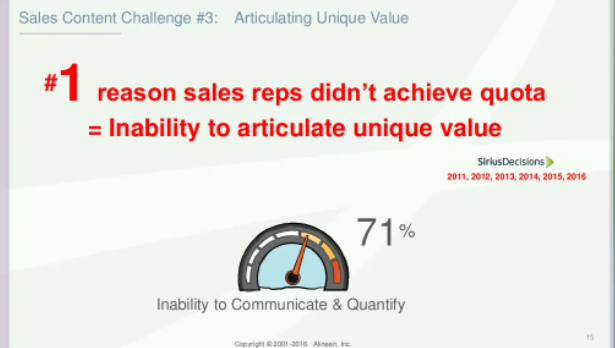While the manufacturing sector itself is in the midst of the Digital Revolution, the manufacturing sales strategy could use a few upgrades.
Manufacturing sales teams face some unique challenges. Many manufacturing companies still focus on selling standalone products like car parts or HVAC equipment. But according to a study from the Alexander Group, 95% of companies say that portfolio selling is a big part of their future sales strategy.
To reach their goals, agents need access to digital catalogs, customer insights, and sales enablement tools that help them bring more value to the buyer.
Below, we’ll go over a few ways that sales leaders can set the stage for success.
Ditch paper catalogs in favor of the "Amazon experience"
In today's cloud-based, mobile selling environment, hauling a thick, hundred-page catalog to meetings isn't a good look. The paper catalog is static, inefficient, and not so great for the environment.
By contrast, digital catalogs provide more than a list of SKUs. They offer real-time access to pricing, inventory counts, and content that helps make sales.
Manufacturers can add information to their catalogs such as details about complementary products or comprehensive solutions. Reps will also have a searchable archive that can pull up technical specs in an instant.
Beyond that, smart features tags, filters, and sorting deliver an Amazon-like experience to reps that support them as they work their deals. This experience is known as faceted search and is used on shopping sites to help users quickly find what they’re looking for by selecting a category from the navigation menu.
In a B2B context, faceted search-based mobile apps help reps prepare more accurate quotes, sort through thousands of SKUs, and quickly identify upgrades and cross-selling opportunities.
Help reps communicate value to customers
According to research from SiriusDecisions, the number one reason reps miss their quotas is an inability to communicate value.

In a Harvard Business Review survey on why salespeople lose deals, 40% of participants look for reps who:
- Listen to them
- Gain an understanding of their problem
- Present helpful solutions
Another 30% said they preferred reps that made them feel comfortable. This is because they believe that the rep would look out for their long term needs. The remaining 30% said they prefer reps who challenge their perceptions and offer solutions they would not think of themselves.
Though each group stated a preference for a different selling style, all respondents stated they value salespeople who help them reach their goals. Today's salesperson, regardless of industry, needs easy access to information if they want to move toward a solutions-based sales strategy. Not only do they need to act as trusted consultants to buyers, they need to provide the most helpful content at the right time.
Arm reps with the right sales collateral
Keep in mind, if you're working with manufacturers' reps, sellers juggle multiple catalogs and SKU systems simultaneously. Why not make things easy on them by providing them with quick access to prices, specs, AND solutions-focused content?
We've found that for our manufacturing clients using Bigtincan Catalog, the sales collateral that helps manufacturing reps most are price sheets and information about new products.
More specifically, reps say they’d benefit most from the following three types of sales collateral:
- Comprehensive product pages – with pricing, catalog numbers (SKUs), detailed charts, and images of the product. In other words, details to quote.
- Competitive intelligence – including short videos, side by side comparisons, battle cards, ideal customer types, and 'Us vs. Them' PowerPoints.
- Short videos – showing installations, quick guides, in-action movement, and interactive looks inside the technology.
Unfortunately, many sales leaders still abide by the "we don't sell on price" philosophy. But there's a problem with that line of thinking. Shrouding price sheets in mystery adds a roadblock in the customer journey. Reps need prices to meet their sales goals.
Focus on new accounts, not new markets
While the idea of limiting your company’s sales strategy may seem counterintuitive to growth, a focused manufacturing sales strategy can help you close more deals.
Why? Because buyers want a personalized solution. They want content that speaks to their needs and reps that understand their challenges. That narrow focus allows reps to develop expertise in their niche, allowing more time to research target accounts. Every prospect brings different goals and motivations to the table. That means reps need to understand what drives each buyer and approach them with a tailored solution.
According to Boston Consulting Group, manufacturers that create personalized experiences by combining AI and consumer data are seeing revenues rise 6–10%. To put those numbers in perspective, data-driven manufacturers grow 2–3 times more than their counterparts that don’t make personalization a priority.
While teams must invest more effort upfront, a data-driven, personal approach stands to drive more ROI than a one-size-fits-most sales pitch.
Instead of having salespeople cold call and pitch straight out of the gate, reps should ask questions and listen to problems. They should find out who else in the company is involved in the decision-making process and determine who else they should contact. From there, they can craft a customized sales offer and present it to the prospect.
Finally, both sales and marketing teams can perfect their strategy by reviewing content performance, sales notes, and proposed solutions. Built-in feedback loops also help marketers understand which pieces of content are most effective and which ones need to be retired or reworked.
Sales enablement can transform your manufacturing sales strategy
Smart manufacturers know that success hinges on understanding market trends and individual buyer needs. They also know that satisfaction is about more than quality products, it’s about offering the right solution at the right time.
Sales enablement software gives manufacturing reps context, perspective, and basic information at their fingertips. It also can automate manual tasks that stand in the way of selling like data entry or locating information. Delivering flexible training tools helps reps fine-tune their manufacturing sales strategy.
Book a demo to see how Bigtincan can boost manufacturing reps’ performance.
